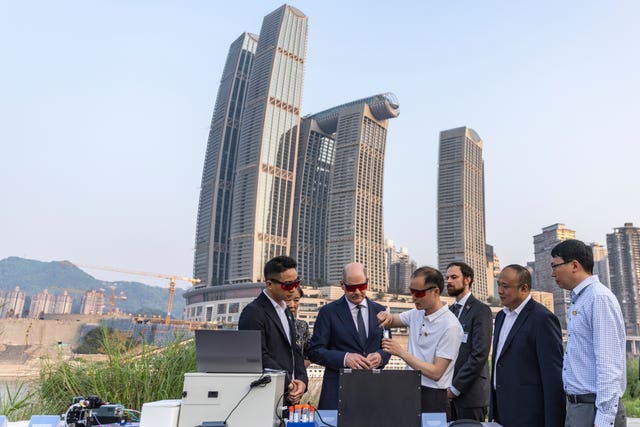German chancellor says Russia’s invasion of Ukraine threatens global security
Olaf Scholz made the comments during a visit to Beijing.

Germany’s Chancellor Olaf Scholz told Chinese leader Xi Jinping who hosted him in Beijing on Tuesday that Russia’s full-scale invasion of Ukraine threatens global security.
It was an apparent call for China to apply greater pressure on its neighbour and close strategic partner to resolve the conflict.
Mr Scholz also told Mr Xi at their meeting that the use of nuclear weapons in the two-year-old war should not even be threatened, German media reported.
Russian President Vladimir Putin warned last month that Russia is ready to use nuclear weapons if its sovereignty or independence is threatened, his latest such threat since invading Ukraine.
Mr Scholz told Mr Xi that Germany’s “core interests” were impacted by the war against Ukraine, which has threatened to spread into a regional conflict and has disrupted energy and global food supplies and other trade.
Russia’s actions “violate a principle of the United Nations Charter and the principle of the inviolability of national borders,” Mr Scholz was quoted as saying by German media.
China has refused to criticise the invasion and has maintained ties with Russia. While China says it is not sending military aid to Moscow, it has provided it with an economic lifeline to help it cope with sanctions from the West.
Beijing has also been urging peace talks between Ukraine and Russia, offering a proposal that says nothing about the settlement of the key territorial disputes between them and which has received a tepid response from the two countries or the international community.
Despite that, China continues to insist that the United Nations Charter should prevail in international affairs and that the sovereignty and territorial integrity of all nations be respected, in apparent contradiction with Russia’s military agenda.

“China encourages and supports all efforts that are conducive to the peaceful resolution of the crisis, and supports the timely convening of an international peace conference recognised by Russia and Ukraine, with equal participation by all parties, and fair discussion of all peace options,” Mr Xi said.
“China is willing to maintain co-operation with all relevant parties, including Germany, in this regard,” Mr Xi was quoted as saying.
Mr Scholz on Monday called for fair competition in trade relations while warning about dumping and overproduction during a talk to college students in the financial hub of Shanghai, where German companies have major investments.
His visit has underscored trade-related tensions as the European Union and other nations complain that China is competing unfairly through the use of tariffs, intellectual property theft and political interference.
The European Union is mulling tariffs to protect its producers against cheaper Chinese electrical vehicle imports, which some fear will flood the European market.
Mr Scholz began his three-day China trip on Sunday in the industrial hub of Chongqing, where he and his delegation of ministers and business executives visited a partially German-funded company and other sites in the vast city, which is a production base for China’s auto and other industries.
Mr Scholz was due to meet Premier Li Qiang later Tuesday in Beijing before returning to Berlin in the late evening.
Along with Russia, China is one of five permanent veto-wielding members of the UN Security Council, and a US intelligence report last week found Beijing has increased equipment sales to Moscow to indirectly boost its war effort against Ukraine.
Berlin is also worried about a potential Chinese invasion of Taiwan, a self-ruled island 130 kilometres (80 miles) off China’s coast that Beijing claims as its own.
Mr Scholz told students in Shanghai that borders “must not be moved by force”.
“We should not be afraid of our neighbours,” he said, emphasising the importance of international institutions such as the World Trade Organisation.
Despite the political and trade frictions, China was Germany’s top trading partner for the eighth straight year in 2023, with 254.1 billion euros (£218 billion) in goods and services exchanged between the sides, slightly more than what Germany traded with the US but a 15.5% contraction from the year before.
This is Mr Scholz’s second trip to China since he became chancellor in late 2021.
It is his first visit since the German government last year presented its China strategy, which met with criticism from Beijing. Premier Li and a delegation of senior officials visited Berlin in June.





